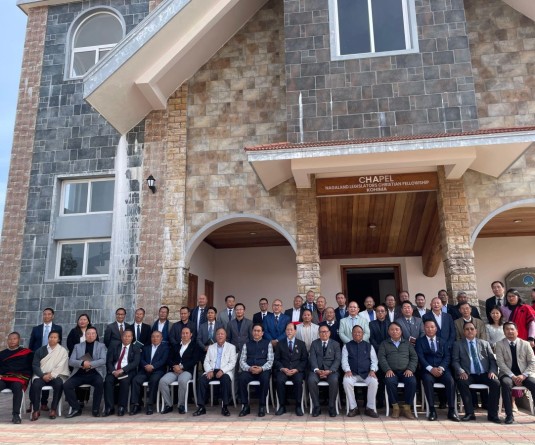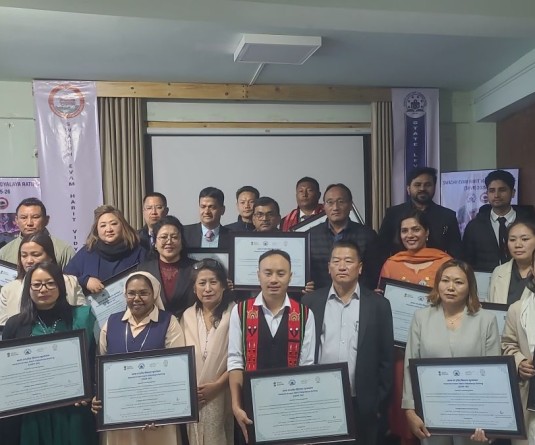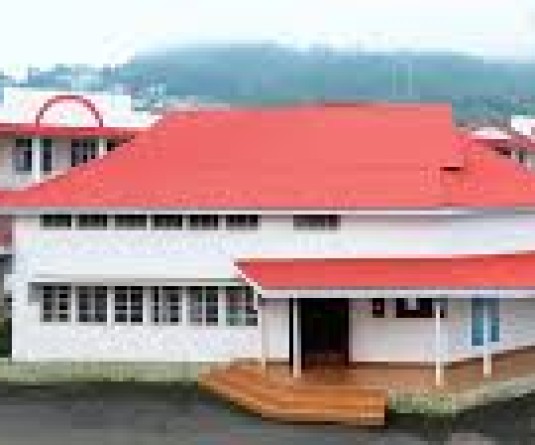Two women farmers – one from Chakhesang and the other from Pochury community exchange seeds during the Biodiversity Festival held at Shatuza village under Weziho Block of Phek district on September 20. (Photo Courtesy: NEN)
Chizami, September 20 (MExN): “Biodiversity is life. Biodiversity is critical for our survival. It is the source of our food and nutrition. Solution to the current global challenges such climate crisis, poverty and hunger lies in our Biodiversity.”
Seno Tsuhah, Honorary Member, North East Network (NEN) stated this while delivering the keynote speech at the Biodiversity Festival held in Shatuza village under Weziho Block of Phek district on September 20.
Under the theme, “Embracing Biodiversity for a Resilient Future,” the festival, hosted by Shatuza village, was supported by the NEN, Millet Network of India, and Rural Electrification Corporation Ltd (REC).
Stressing on the indispensability of biodiversity, Tsuhah further highlighted that today’s global crisis is caused by human interaction with nature, biodiversity loss, extractive development model, greed and corruption.
To this end, she called on the participants to uphold one’s responsibility as stewards and custodians of God’s good creation, by protecting our common resources i.e. lands, forests, water, biodiversity, indigenous knowledge systems.
Encouraging the community to sustain millets-based biodiverse ecological farming, Tsuhah also shared that the UN General Assembly has adopted a resolution to celebrate 2023 as the International Year Of Millets.
She also underscored the critical role that women play in nurturing and sustaining ecological farming, and emphasised the need to include them in all levels of decision-making process.
Dwelling on the Government of India’s recent approval of the National Mission on Edible Oils – Oil Palm (NMEO-OP) scheme with a special focus on the North East and Andaman, Tsuhah stressed that it is important as a “community to make informed decisions on taking up projects such as this, keeping in mind our biodiversity and sustainability.”
Also speaking at the event, L Shishi, a Community Knowledge Holder from Shatuza village said that millets are indicator of wealth.
“We have a large variety of millets and many big granaries for storing millets. Millets are pest-resistant and can be stored upto 60 years. Millets can be consumed in multiple ways – as drinks, as snacks, as ghalho, etc. Our ancestors cultivated millets every year until our generation where its cultivation started declining. Though it was only recently that we became aware of the nutritional value of millets and started cultivating with interest,” she stated.
The Village Council Chairman Yisisotha, L Kanu VCC Yisisotha also pointed out how forests and many trees have disappeared.
“We used to see hornbill birds in our forests before but we don’t see them anymore. Before we lost everything, we need to protect our biodiversity, not only for this generation but for the generations to come,” he added.
According to a press release from the NEN, the festival included a Seed exchange between 6 villages - 3 Chakhesang villages and 3 Pochury village; a display of seed diversity by 8 villages under Weziho block ie Phor, New Phor, Wuzu, Yisi, Yisisotha, Shatuza, Kuzatu, Hutsu; of uncultivated food diversity by Kuzatu village, and a Farmers’ Market where food and craft items were sold by the participating villages.
The festival was attended by community leaders, church elders, representatives from Pochury Mothers’ Association, Students' Union, and women farmers from 8 villages under Weziho block, and 3 villages under Chizami block in Phek district, it added.






